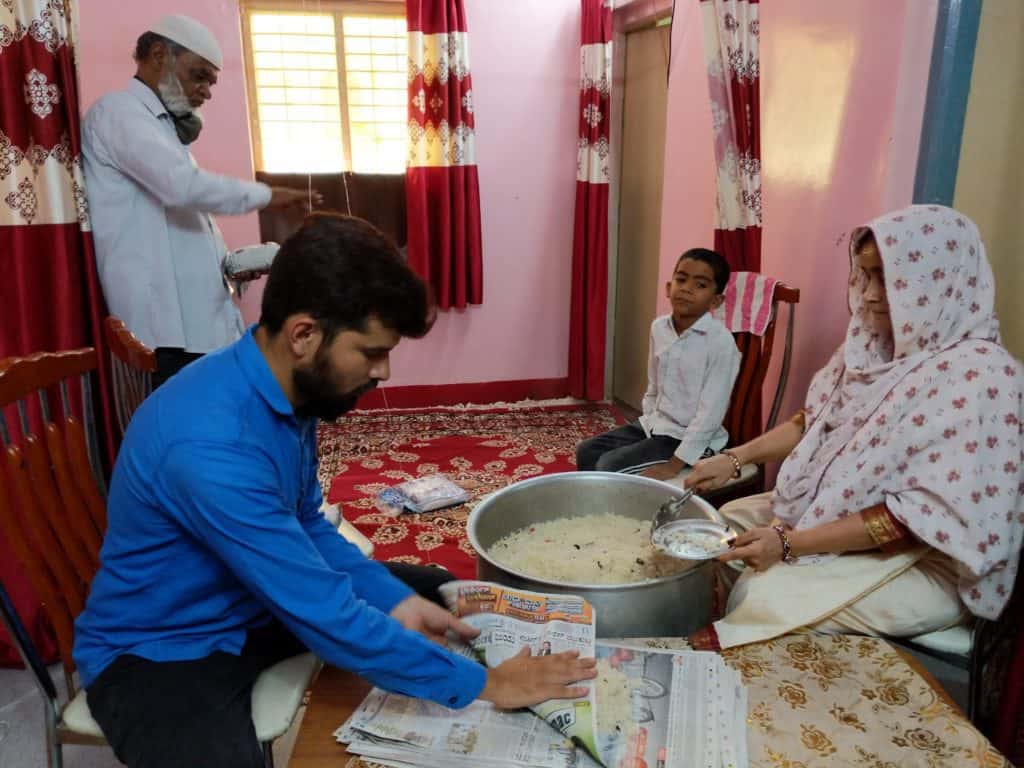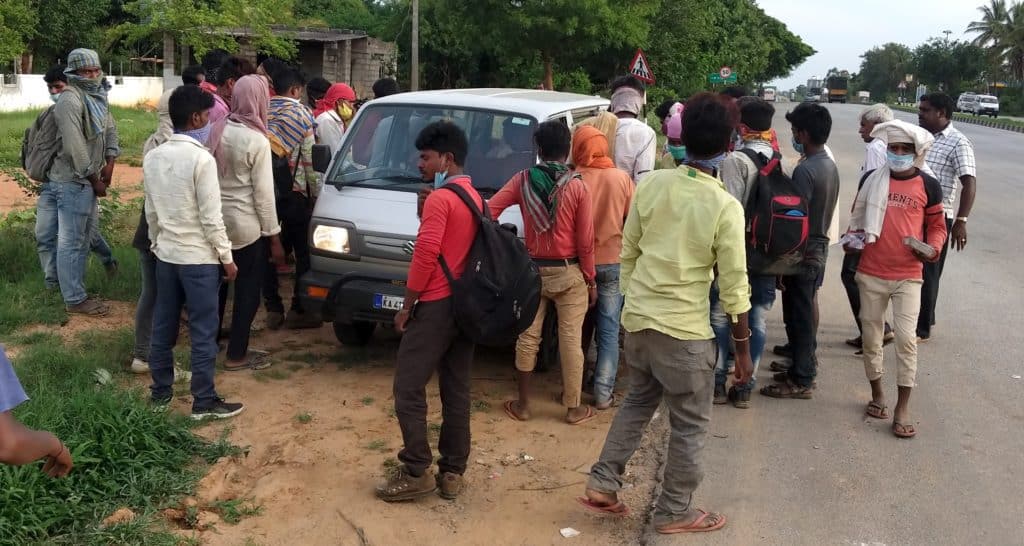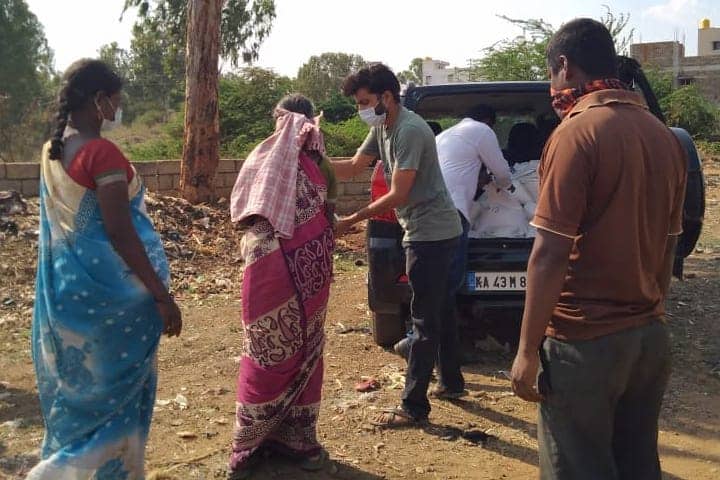For weeks, thousands of migrant workers who had started on their arduous journeys back home, trudged past Devanahalli cross. The sight, Mukkham Ila says, made her weep. “We can understand the hunger and desperation. They just wanted to go home. We couldn’t bear to see them hungry,” she says.
Some time in the first week of May, Mukkham asked her son to buy wheat, vegetables and groceries. The family’s income from a mutton shop and from daily-wage labour had been hit by the lockdown. Still, they managed to spare over Rs. 2,500.
“We wanted to feed at least 80 people. We didn’t have gas to cook this many meals. So, we gathered wood from the area and made rotis in a chula. It took over 10 hours of cooking, but we feel happy we’ve helped at least a few people,” she says.
With her husband’s brothers also sharing the responsibility, cooking for migrants became a family affair. Their aim was to pack around 80 meals which the travellers could carry on their long walk.
Highway of hunger and hope
Devanahalli Cross is an intersection about 40 km from Bengaluru, where the Bengaluru-Hyderabad highway (NH 44) bypasses Devanahalli, a small town with a medieval fort, now famous for its proximity to the Bengaluru international airport. It is a pass-through for most returning workers heading to the northern states.
On the day we visited, Mukkham’s brother-in-law, 70-year-old Saifullah and his family were preparing Biryani and curry in a large vat in their small house, situated behind the historic fort. Saifullah used to run a small eatery at Devanahalli before the lockdown brought down its shutters — for over two months. Income was a concern, but he was not fretting.

By 5 pm, the rice was cooked. His wife Jahnam and son Shamsheer packed them into little parcels in their living room. These would be carried on bikes and cars along the highway. The family would flag down the returning workers and give them the food packets. “It was heart breaking to see them walk through the day and night, carrying luggage. There are no places to eat…What if it was our children were stranded and trying to come home,” says Saifullah.
“What if it was our children were stranded and trying to come home,” says Saifullah.
All along the highway, desperate migrants have found a helping hand. Vans from the city stop to provide water bottles and snacks, while petty tea shops and bakeries have set aside biscuit packets, bananas and water bottles for those setting out to walk hundreds of kilometres.

Further ahead, Ashok Kumar, a cement dealer in Karahalli village, loads a van full of packed meals and distributes to whoever he comes across on the highway. Over three days, he has distributed nearly 850 meals. He had to stop when his own savings were being depleted. “We tried as much as we could. We grew up in poverty; that drives us to help when one is in pain and hunger,” he says.
“We grew up in poverty; that drives us to help when one is in pain and hunger,” says Ashok Kumar.
A city opens its heart and purse strings
In Bengaluru, NGOS took the lead in raising funds and distributing lakhs of ration kits and pre-prepared meals during the worst phases of the lockdown. Apart from these, established eateries such as Beijing Bites, a popular Chinese food franchise, and FoodCrate, a cloud-based kitchen, undertook large-scale distribution of prepared food.
For instance, in a posh gated community, residents started by helping out the families of domestic helps. Eventually they branched out to provide a month’s rations to over 100 families in Kengeri. “How does one sit idle at home when there is so much hunger around,” says a resident who does not want to be named.
Similarly, a software engineer and activist, who had helped organisations raise over Rs. 50 lakh for ration kits, personally took on the task of collecting money from families and friends to give to migrants who were walking home. Through contacts and sources, he would obtain mobile payment details of the migrants and send over money that would help them along the way. “People are moved by the pictures of migrants. They want to help, but don’t know how,” he says.
“We’d have to just ask in our groups and people would donate. There is immense kindness during this time.”
Indradev Bhuiyan, a construction worker from Palamu in Jharkhand, was among those who received money through his mobile phone. He and 50 others from the district had been stopped at the Karnataka-Andhra Pradesh border. For two days, they attempted to cross, before giving up. A week later, they were put on a train to Jharkhand.
“The money we received in our mobile phone ensured that we could get food and water for the days we were on the highway. We will not forget this kindness,” Bhuiyan says over phone from his village.
Plunging into relief work
At the end of the first phase of the lockdown, Sunil Udasi, 40, a businessman in Fraser Town, stepped out to buy groceries. There, he caught sight of many people pleading for food. “There has to be something we could do about this. I asked my friends and they offered help…some, by giving money, some by volunteering,” he says.
Sunil had no contacts or networks when he started off on March 15. It was sheer will to reach out to as many as he could. He approached his favourite family-run eatery on Commercial Street and engaged them to make 50 food packets. That was on the first day.
As he went around the city, the magnitude of hunger and need shocked him. More work had to be done. There was no dearth of funds: people were willing to contribute and as news of his work spread, more people pitched in.
The problem was to convince the authorities that people like him mattered in the fight against hunger in the city. “It took more than two days to get a pass to travel within the city. If the process was easier, I’m sure more individuals would’ve helped on the ground,” says Sunil.
Armed with a pass, meals and an eager eye to help, Sunil and his friends travelled the city and eventually on the highways. In 40 days, he estimates that more than 7,000 people, mostly the vulnerable migrant population, were reached.
“We did not take photos of those we were helping. And yet, many wanted to give. I’m surprised by people still reaching out to me and insisting on giving money,” says Sunil, who has distributed more than 3,000 kg of bananas, countless water bottles, meals, kits, sandals, caps and other essentials.
In Doddaballapur, third-year dental college student Akash R. Prasad, 20 had been working with NGOs during the break he got from his studies. As soon as the lockdown was announced, he hit the ground on his motorcycle, riding along a long stretch from Yelahanka to Tumakuru Road. The peri-urban region, where a large population of daily-wage workers lived, was not catered to by the larger NGOs, he realised.

As soon as he’d spot make-shift settlements where people had not eaten, Akash reach out to NGOs for rations and even raised money through crowdfunding sites. “Initially, there was a lot of response and we could organise ration kits. However, after a month or so, it started to become difficult to raise funds. Now, we’re finding daily-wagers who have exhausted their savings and are struggling to eat,” he says.
Contrary to expectation, the phase-wise relaxation — and imminent lifting of the total lockdown — has not stopped the exodus. And considering the fact that they are worse off with every passing day — in terms of cash, health and mental state — they need Bengaluru’s continued support more than ever.